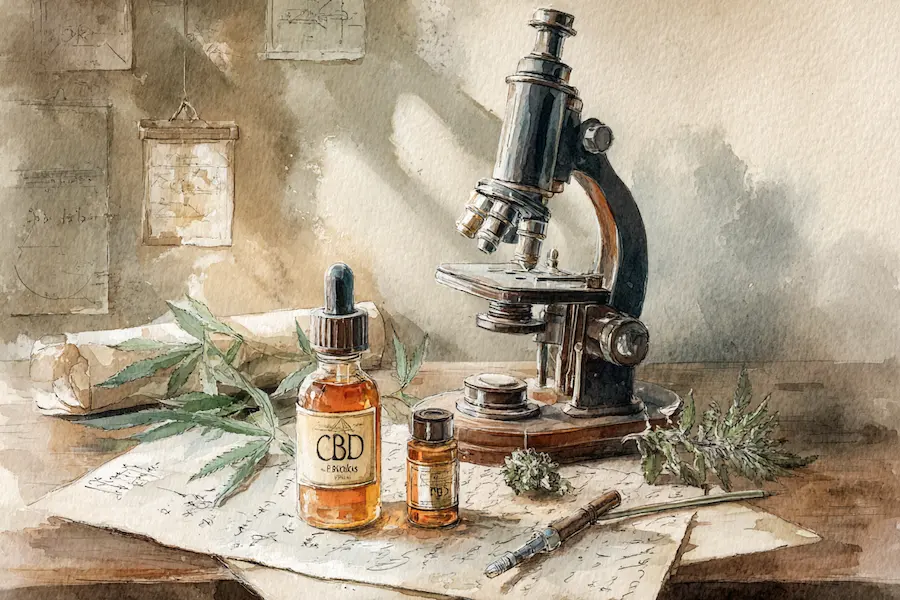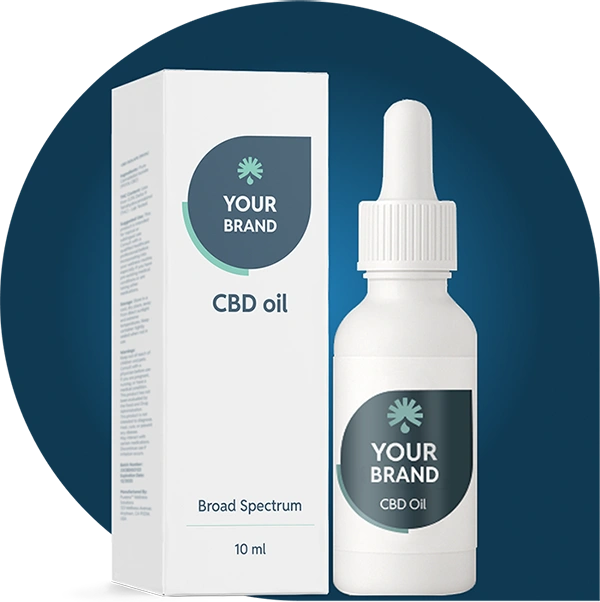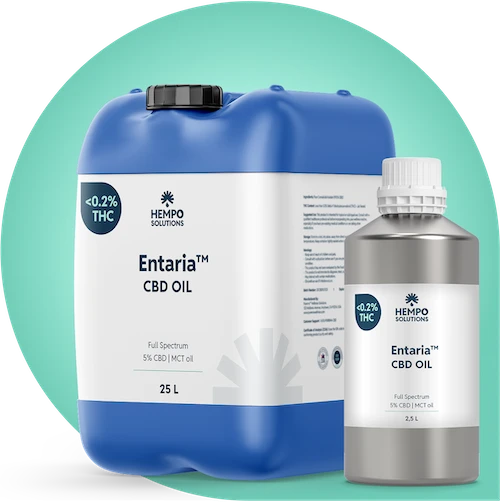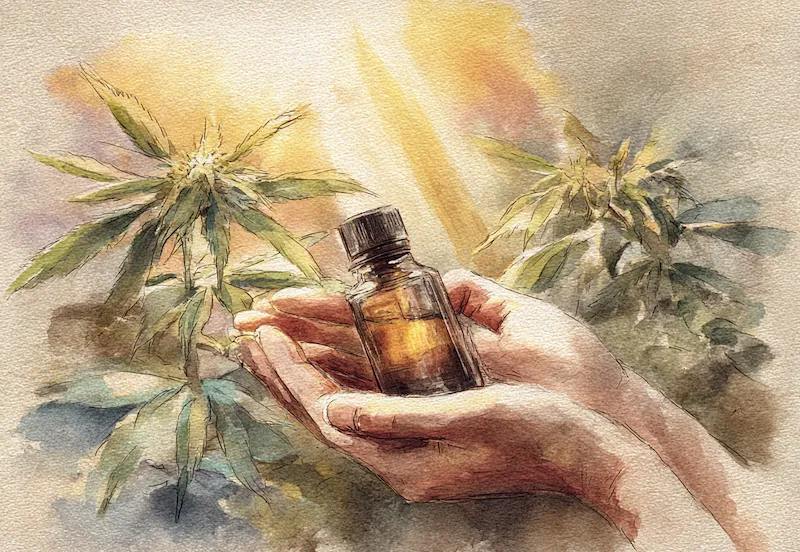Table of Contents
-
How Does CBD Work in the Body?
Is CBD Effective for Stress and Anxiety?
How Long it takes for CBD to start working?
CBD and Specific Anxiety Disorders
Pros and Cons of Using CBD for Stress
Choosing CBD Products for Your Brand
How to Ensuring Product Quality
Consumer Trends
Final Thoughts on CBD for Anxiety
How Does CBD Work in the Body?
CBD interacts with the body’s endocannabinoid system (ECS), which helps regulate mood, stress response, and sleep. It binds indirectly to CB1 and CB2 receptors found in the brain and throughout the body. More importantly, CBD is believed to influence serotonin receptors (specifically 5-HT1A), which are linked to feelings of anxiety and depression.
CBD may increase GABA activity. GABA is a neurotransmitter that promotes relaxation and reduces overstimulation in the brain. This, along with CBD’s influence on serotonin receptors, may explain why many people feel calmer or more balanced after using it.
CBD may also help reduce cortisol levels – the body’s primary stress hormone. Lower cortisol can result in calmer baseline stress responses, adding another layer to CBD’s anxiety-supporting profile.
Is CBD Effective for Stress and Anxiety?
Research on CBD’s effects on anxiety is still developing, but current evidence is very promising. Several studies have found that CBD may help reduce symptoms of generalised anxiety disorder (GAD), social anxiety, and even insomnia caused by stress.
For example:
- A 2019 study showed that people taking 25 mg of CBD daily reported better sleep and reduced anxiety symptoms after a month.
- A 2011 trial found that 600 mg of CBD reduced anxiety in participants facing public speaking events.
- Additionally, a 2019 case series published in The Permanente Journal reported that patients with PTSD experienced improvements in anxiety and sleep after using CBD as part of their treatment.
Studies suggest CBD’s anxiety-reducing effects are dose-dependent. Moderate doses between 300-600 mg have consistently shown better results than very low or very high doses.
It’s important to note that CBD affects everyone differently, and users should consult with a healthcare provider before using CBD, especially if they are on medication.
How Long It Take for CBD to start Working?
The time it takes for CBD to start working depends on how it’s taken:
Sublingual (Oils & Tinctures)
Placed under the tongue, CBD oils are absorbed through mucous membranes and typically take effect within 15-45 minutes.
Inhalation (Vapes)
Inhaling CBD via vaping delivers effects almost immediately, usually within a few minutes. This is one of the fastest-acting methods but comes with more regulatory considerations.
Oral (Gummies & Capsules)
Because they must pass through the digestive system, gummies and CBD capsules usually take 45 minutes to 2 hours to kick in. However, effects may last longer.
Topicals
Topical CBD products are not typically used for stress or anxiety since they do not enter the bloodstream. Their effects are localised and better suited for joint or muscle discomfort.
CBD and Specific Anxiety Disorders

Generalised Anxiety Disorder (GAD)
Studies have found CBD to be helpful in reducing anxiety levels in people with GAD, particularly at moderate doses (25-75 mg daily).
Depression Related to Anxiety
CBD may help improve mood by influencing serotonin pathways. In one study involving 400 participants, CBD use was linked to improved mental health stability and overall mood.
Post-Traumatic Stress Disorder (PTSD)
CBD has shown potential in helping people with PTSD by easing the intensity of traumatic memories and emotional reactions. This effect may be related to how CBD interacts with CB1 and CB2 receptors, which play a role in how the brain processes fear and recovers from trauma.
Social Anxiety Disorder (SAD)
Clinical research found that 400-600 mg of CBD could lower anxiety in people with SAD during stress-inducing situations, like public speaking.
Other Neurological and Psychiatric Disorders
CBD may offer potential benefits for other conditions such as schizophrenia and OCD, but research is still in early stages.
Pros and Cons of Using CBD for Stress and Anxiety
Pros
- Naturally derived and minimally processed
- Multiple ways to consume (oils, gummies, capsules, vapes)
- Non-addictive and generally well tolerated
- Many users report noticeable improvement
Cons
- Regulations are inconsistent across regions
- Product quality varies widely between manufacturers
- Often more expensive than medication (not covered by insurance)
- Potential side effects and drug interactions
Selecting CBD Products for Your Brand’s Stress & Anxiety Line
Creating effective stress-relief CBD products starts with smart format choices, thoughtful ingredient blends, and attention to consumer safety.
Popular CBD Formats for Stress Relief
Choose formats that fit your audience:
- Oils and tinctures – for premium, health-focused users
- Capsules and gummies – for ease of use and consistent dosing
- Vapes – fast-acting, but consider legal and perception issues
- Sprays – niche but growing demand
Cannabinoid Synergy & Ingredient Profiles
CBD products aimed at stress and anxiety support may be more effective when formulated with complementary compounds. Cannabinoids like CBG and CBN, along with calming terpenes such as linalool and limonene, can enhance the overall impact through what’s known as the ‘entourage effect‘. This synergy may help amplify the calming properties of each ingredient, offering a more balanced and noticeable experience for users.
Clinically Supported Dosage Ranges for Anxiety
While individual responses vary, research has identified effective dosage ranges for different anxiety-related conditions:
-
General anxiety: 25-75 mg per day has shown benefits in reducing symptoms.
-
Social anxiety: Single doses of 300-600 mg helped reduce stress in public-speaking tests.
-
PTSD: Daily doses between 30-50 mg were associated with symptom improvement.
Start low and increase gradually while monitoring effects.
Safety Considerations & Side Effect Transparency
CBD is generally considered well-tolerated and safe, but side effects like fatigue, appetite changes, or digestive issues may occur for some individuals. CBD may also interfere with how certain medications are metabolised in the liver by inhibiting CYP450 enzymes. This includes common drugs such as SSRIs, benzodiazepines, and blood thinners, making it important for consumers to consult with a medical professional.
Clear FAQs on your website or packaging can reassure consumers and reduce misuse.
Ensuring Quality and Compliance in CBD Products

To build trust and credibility, CBD brands should uphold high standards across sourcing, production, and labelling. These core practices help ensure products are safe, legally compliant, and ready to succeed in a competitive market.
Hemp Source & Cultivation Practices
Use organically grown industrial hemp (Cannabis sativa) from EU-approved varieties that are certified under EU regulations. These typically include fiber or dual-purpose cultivars bred for consistent, low THC and high CBD content. Choosing certified industrial hemp ensures regulatory compliance, quality consistency, and traceability, from seed to shelf, while also supporting reliable cannabinoid profiles in your final product.
Superior Extraction Methods
Supercritical CO₂ extraction is the industry standard for CBD products due to its efficiency and solvent-free output. However, as the market becomes more competitive, brands aiming for higher quality may benefit from advanced methods such as dual CO₂ extraction. This technique involves two stages of extraction to better preserve cannabinoids and delicate terpenes, improving consistency and enhancing the entourage effect in full-spectrum formulations.
Third‑Party Lab Testing & Certificates of Analysis
Every product should be backed by a Third-Party Laboratory COA confirming cannabinoid levels, terpene profiles, and absence of contaminants (heavy metals, pesticides, etc.). Make these accessible to your customers.
Packaging Transparency & Traceability
Label your products clearly with ingredient breakdowns, batch numbers, and QR codes for easy COA access. Tamper-evident packaging adds trust.
Consumer Trends: CBD Use for Anxiety in EU
Survey Data and Consumer Behaviour
Anxiety is one of the top reasons people in Europe use CBD. In the UK alone, around 38% of users cite stress or anxiety as their main reason for using CBD.
Key Market Insights for Retailers and Brands
There is high demand for trustworthy, easy-to-use products. Brands that offer lab-tested, well-labeled CBD with transparency and consistency are likely to outperform those with vague or unverified claims. Therefor its very important to choose a CBD manufacturer who offers products with full transparency.
Final Thoughts on CBD for Anxiety
CBD is a promising wellness tool for managing stress and anxiety symptoms. It may help regulate mood and support calm through natural interaction with the body’s systems. While it’s not a substitute for medical treatment, many people find it a helpful addition to their routine.
For CBD brands, the opportunity lies in offering high-quality, compliant products backed by science and clear communication. And remember, helping your customers make informed decisions builds trust and long-term value.







